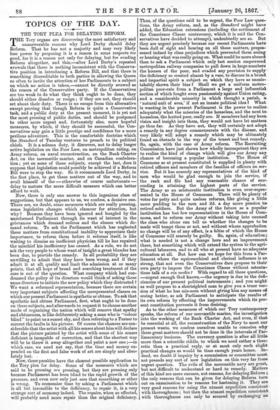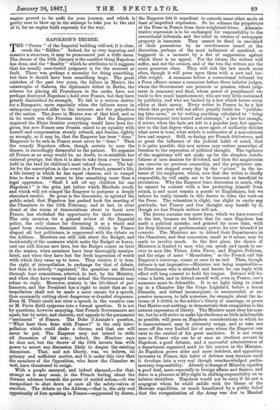TOPICS OF THE D.Y.
THE TORY PLEA FOR DELAYING REFORM.
THE Tory organs are discovering the most satisfactory and unanswerable reasons why Lord Derby should delay Reform. That he has not a majority and may very likely lose power by proposing it is a reason in some respects too good, for it is a reason not only for delaying, but for evading Reform altogether, and this,—after Lord Derby's repeated avowals that there is nothing inconsistent with the Conserva- tive position in introducing a Reform Bill, and that there is something discreditable to both parties in allowing the Queen so often to invite the attention of her Parliaments to a subject on which no action is taken,—cannot be directly avowed as the reason of the Conservative party. If the Conservatives are too weak to do what they think ought to be done, they should either dissolve or resign ; if they are not, they should set about their duty. There is no escape from this alternative except proving that though Reform is quite a Conservative task, and a public duty at the present moment, it is yet not the most pressing of public duties, and should be postponed to other more urgent and, fortunately also, more hopeful measures, by which, if they should be successful, the Con- servatives may gain a little prestige and confidence for a more perilous adventure. This is the comfortable doctrine which the Standard of Tuesday ventures to preach to its political chiefs. It is a solemn duty, it discovers, not to delay longer active legislation on the Poor Law, on metropolitan rating, on Army reform, on naval reconstruction, on the Bank Charter Act, on the mercantile marine, and on Canadian confedera- tion ; yet on none of these subjects, except the last, does it suppose that legislation could possibly be achieved if a Reform Bill were to stop the way. So it recommends Lord Derby, in the first place, to get these matters out of the way, and to avail himself of the — otherwise of course unfortunate delay to mature the more difficult measure which can better afford to wait.
Now, there is only one answer to this ingenious class of suggestions, but that appears to us, we confess, a decisive one. There are, no doubt, some measures which are really pressing, some legislative changes which clamour for attention, but why ? Because they have been ignored and bungled by the unreformed Parliament through its want of interest in the grievances which demand redress and the abuses which de- mand reform. To ask the Parliament which has neglected these matters from constitutional inability to appreciate their importance, to reform them before it reforms itself, is like waiting to dismiss an inefficient physician till he has repaired the mischief his inefficiency has caused. As a rule, we do not ask the very people to whose want of insight a great blunder has been due, to provide the remedy. In all probability they are unwilling to admit that they have been wrong, and if they admit it at all, qualify and limit the admission at so many points, that all hope of broad and searching treatment of the case is out of the question. What company which had con- demned the policy of its directors would think of asking those same directors to initiate the new policy which they distrusted ? We want a reformed representation, because there are certain very important subjects affecting the unrepresented classes on which our present Parliament is apathetic or obtuse. To ask that apathetic and obtuse Parliament, first, what ought to be done on these subjects, and afterwards to request it to choose another mode of organizing the nation which will remove that apathy and obtuseness, is like deliberately asking a man who is "colour blind" to paint us a sunset sky, and then referring to a Turner to correct the faults in his picture. Of course the chances are con- siderable that the artist with all his senses about him will declare that the picture painted by the artist with some of his senses deficient is incapable of correction, and that the shortest way will be to throw it away altogether and paint a new one ;—in which case, we need not say, that the time and money ex- pended on the first and false work of art are simply and abso- lutely lost.
Now, these parables have the clearest possible application to the Tory plea for delay. Some of the measures which are said to be pressing are pressing, but they are pressing only because Parliament has been blind to the rapid growth of the pressure, and even now only just sees that something or other is wrong. To economize time by asking a Parliament which is all but insensible to the deficiency, to repair it, is a very strange sort of economy indeed. The repairs, when so effected, will probably need more repair than the original deficiency. Thus, of the questions said to be urgent, the Poor Law ques- tions, the Army reform, and, as the Standard might have added, the Education extensions (including the settlement of the Conscience Clause controversy, which it is said the Con- servatives have decided to attempt), undoubtedly are so. But they are urgent precisely because our recent Parliaments have been dull of sight and hearing on all these matters, prepos- sessed indeed by class prejudices which prevented them seeing or hearing what was really going on. What could be more absurd than to ask a Parliament which only last session empowered metropolitan railway companies to pull down in large numbers the houses of the poor, and evaded any provision to supply the deficiency so created almost by a ruse, to discuss in a broad_ and impartial spirit a subject on which they have so unmis- takably shown their bias ? Shall we get a uniform metro- politan poor-rate from a Parliament a large and influential section of which fought even passionately against Union rating,. and a considerable minority in which thought a parish, a.
natural unit of area,' if not an innate political idea ? What is wanting in the present Parliament is the power to realize- adequately what the miseries of the houseless, and the next to houseless, the hutted poor, really are. If members had any keen. vision and insight into them, they would not have let matters. go thus far. As they have not, they will certainly not adopt a remedy in any degree commensurate with the disease, and very likely will adopt a remedy which may be ultimately found an obstacle in the way of the truest and best remedy.. So, again, with the case of Army reform. The Recruiting Commission have just shown how wholly incompetent they are to realize the kind of change which will give our Army any chance of becoming a popular institution. The House of Commons as at present constituted is supplied in plenty with retired officers and members of the families of officers on ser- vice. But it has scarcely any representatives of the kind of men who would be glad enough to join the service, if the rank and file had any reasonable chance of suc- ceeding in attaining the highest posts of the service. The Army as an aristocratic institution is even over-repre- sented in the House of Commons. There will be plenty of votes for petty and quite useless reforms, like giving a little more pudding to the men and 2d. a day more pension to retired soldiers. But the Army of the future as a popular institution has but few representatives in the House of Com- mons, and to reform our Army without taking into counsel the class who alone can tell us whether the changes to be made will tempt them or not, and without whose approbation no change will be of any effect, is a betise of which the House of Commons will scarcely be guilty. So, again, of edu cation ; what is needed is not a change here and an improvement there, but something which will extend the system to the agri- cultural labourers, and to all who at present have no adequate education at all. But how can we hope for this from a Par- liament where the squirearchical and clerical influence is so strong, that not even the Conservatives dare propose to their own party to impose the Conscience Clause without ostenta- tious talk of a via media ? With regard to all these questions, —urgent enough God knows,—the urgency is due to the defi- ciencies of our present political instruments ; and you might as well propose to a shortsighted man to give you a truer ver- sion of what he has mis-seen without giving him any means of seeing better, as ask Parliament to anticipate the results of its own reform by effecting the improvements which its pre- sent constitution prevents it from desiring.
As to the other measures of which our Tory contemporary speaks, the reform of our mercantile marine, the investigation into the working of the Bank Charter Act, and even, if that be essential at all, the reconstruction of the Navy to meet our present wants, we confess ourselves unable to conceive why these great matters should not be done in the intervals of Par- liamentary business. The currency question is after all little more than a scientific riddle, to which we need rather a theo- retic than a practical reply, or at most only such slight practical changes as would be time enough years hence. In- deed, we doubt if inquiry by a commission or committee must not precede any sort of new legislation on this very far from urgent question. The evils of the mercantile navy are great, but not difficult to understand or hard to remedy. Matters of this kind are mere excuses, not reasons, for delaying Reform ; the only reasons that can be given for delaying Reform turn out on examination to be reasons for hastening it. They are very good reasons for using the utmost expedition consistent with thoroughness ; but then the utmost expedition consistent with thoroughness can only be secured by exchanging an engine proved to be unfit for your journey, and which is pretty sure to blow up in the attempt to take you to the end of it, for an engine built expressly for the way.































 Previous page
Previous page